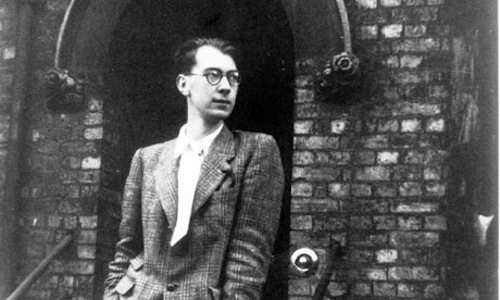
Larkin at Oxford in 1943, before “the failures and remorse of age.”
W.H. Auden‘s “September 1, 1939” was a World War II poem, without a single gun in it, and then had a powerful revival on 9/11. The New York Times recounted its newfound fame:
”Auden’s words are everywhere,” wrote the author of a ”Letter From New York” in The Times Literary Supplement of London. At least a half-dozen major newspapers reprinted ”September 1, 1939” in its entirety. It was read on National Public Radio. It was introduced into hundreds of chat rooms on the Internet. In the Chicago area, the Great Books Foundation and The Chicago Tribune sponsored discussions of it. Students at Stuyvesant High School, four blocks from ground zero in Manhattan, produced a special issue of their school newspaper (which The New York Times distributed to its readers in the metropolitan area) prominently featuring one of the poem’s most familiar lines, ”We must love one another or die.”
Surely, however, it shared the somber honors with Adam Zagajewski’s “Try to Praise the Mutilated World,” which appeared on the back cover of the New Yorker after 9/11.

Praising the mutilated world…
Could the poem for World War I be Philip Larkin‘s MCMXIV? It’s getting a lot of play this month, during the centenary of the beginning of the Great War. The poem was first published in 1964, fifty years after the events it describes, in the collection Whitsun Weddings.
A few words from critics about Larkin that I found along the way: Andrew Sullivan feels that Larkin “has spoken to the English in a language they can readily understand of the profound self-doubt that this century has given them.” X.J. Kennedy wrote that Larkin’s oeuvre is “a poetry from which even people who distrust poetry, most people, can take comfort and delight.” J. D. McClatchy said that Larkin wrote “in clipped, lucid stanzas, about the failures and remorse of age, about stunted lives and spoiled desires.”
XCMXIV is only one remarkable sentence long (mind the punctuation), and describes the enlistment of naïve young men at the war’s outset. Read it, and hear it, in the video below.
Tags: Adam Zagajewski, Andrew Sullivan, J.D. McClatchy, Philip Larkin, W.H. Auden, X.J. Kennedy


August 13th, 2014 at 4:42 pm
NPR read one of Auden’s poems right before Gulf War I, but I’m no longer sure that it was “September I, 1939.” Certainly it was of that period.
I would pick Robert Graves’s “Remembering War”, though eventually he dropped it from his Collected Poems. I suppose that Houseman’s “Epitaph on an Army of Mercenary Soldiers” was a bit premature, in that the sum of things took a lot more saving; still, it is memorable.
August 14th, 2014 at 2:59 pm
Actually, i) it was probably from the prologue to “The Age of Anxiety” that NPR read, ii) the poem by Robert Graves is “Recalling War”. And probably I’d nominate Hardy’s “In Time of ‘The Breaking of Nations'” ahead of Larkin.